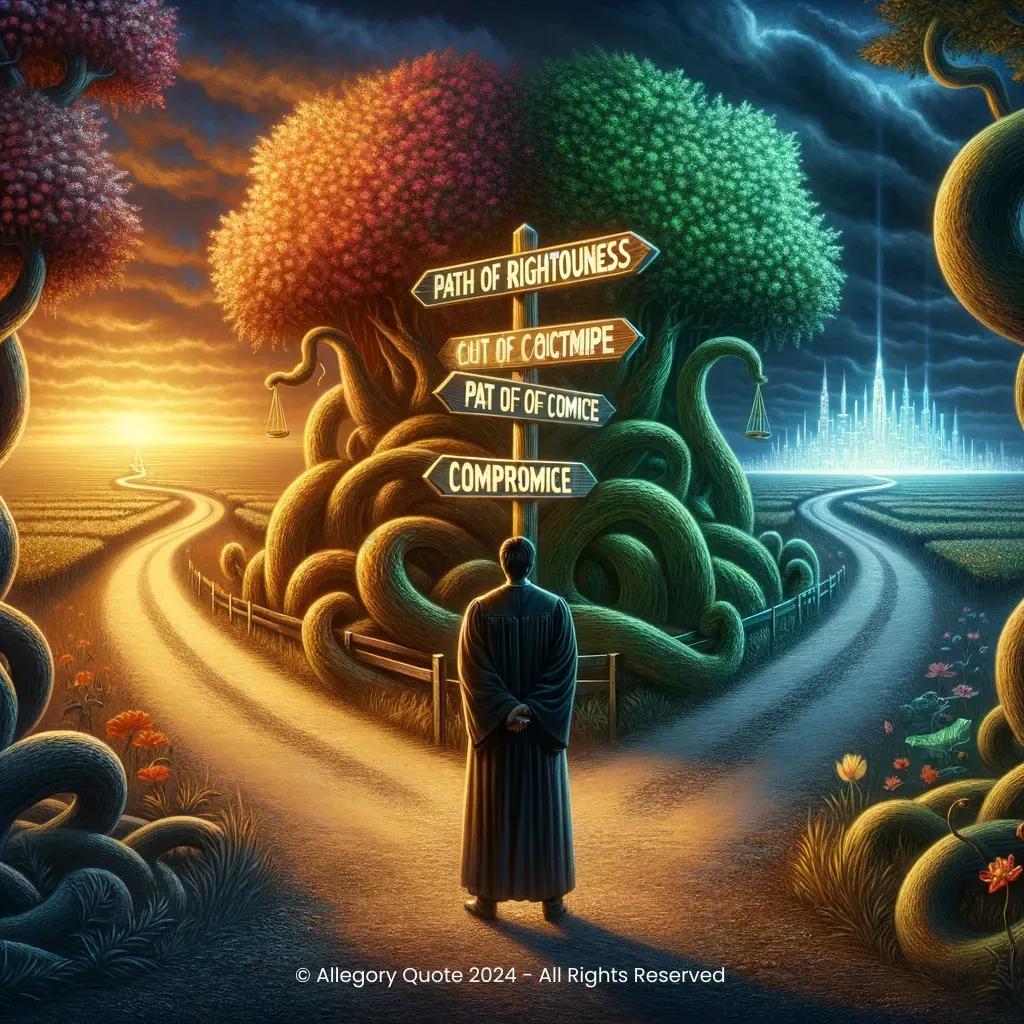To do a great right, do a little wrong

0
0
0
0
- Meaning
- This quote suggests the notion of moral flexibility: sometimes achieving a significant, positive outcome might require minor ethical compromises. In "The Merchant of Venice," Bassanio uses this reasoning in Act IV, Scene 1, to justify bending the law to achieve a more significant justice. The phrase creates a philosophical conundrum about whether the end justifies the means and shines a light on the troubles and ambiguities inherent in moral decision-making.
- Allegory
- The serene judge or philosopher at the crossroads represents the reflective decision-maker, embodying wisdom and the burden of moral choice. The separate paths symbolize the stark distinction between righteousness and compromise. The glowing city of "Great Good" in the background signifies the ultimate desirable outcome, offering a visual metaphor for the complexities and consequences of ethical decisions. The contrast of light and shadow along these paths invites viewers to ponder the nuanced journey toward achieving great justice through minor ethical concessions.
- Applicability
- In daily life, this phrase can be applied when one faces dilemmas that involve ethical trade-offs. It reminds individuals to reflect on the broader consequences of their actions and consider if minor ethical compromises could lead to a more significant good. However, it also serves as a cautionary reminder to weigh such decisions carefully and consider the potential for justifying wrong actions too easily.
- Impact
- Shakespeare’s exploration of justice and ethics in "The Merchant of Venice" has had a lasting impact. The phrase has sparked discussions in literature, law, and philosophy. It’s often cited in debates concerning ethical dilemmas and the morality of using dubious means to achieve desirable ends, highlighting the complexity of human morality.
- Historical Context
- This phrase originates from "The Merchant of Venice," written by William Shakespeare around 1596-1599. The Renaissance period, a time of revived interest in the arts, philosophy, and humanism, forms the backdrop of this phrase. This era encouraged deep exploration of ethical dilemmas like the one the phrase encapsulates.
- Criticisms
- This phrase has stirred controversy because it seemingly endorses the idea of doing wrong for a greater good, which could be misused to justify unethical behavior. Critics argue that it can dangerously blur the lines of morality, making it easier to rationalize unethical actions if they produce beneficial outcomes.
- Variations
- There are variations of this phrase across cultures. For example, the concept exists in various religious and philosophical traditions that debate the moral implications of using unethical actions for greater benefits. In some interpretations, it’s seen as a pragmatic approach, while others view it with suspicion and caution.
-

To weep is to make less the depth of grief.
-

When sorrows come, they come not single spies, but in battalions.
-

There is nothing either good or bad but thinking makes it so.
-

O tempora, o mores!.
-

I must be cruel, only to be kind.
-

Good night, good night! Parting is such sweet sorrow.
-

I am a man more sinned against than sinning.
-

I am not bound to please thee with my answers.
-

To do a great right do a little wrong.
-

To be, or not to be, that is the question.
No Comments